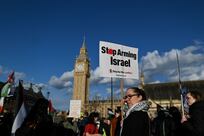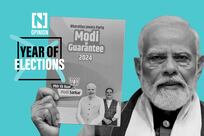In late 2001, after helping expel the Taliban from northern Afghanistan, the victorious militia of the ethnic Hazara warlord Muhammad Mohaqeq whooped through the village of Qulyambo, a mud-brick homestead of several hundred ethnic Pashtun peasants. In pickup trucks and on foot, the fighters spilled from the centre of the village into the narrow, crooked clay streets. They corralled all the livestock they could find and tossed some into the flatbeds of their trucks and shot the rest. Then they rounded up all the men they could find and shot them, too. Then they entered the houses where Qulyambo's women and children crouched beneath the dun hemispheres of hand-slapped roofs. "They touched all the women and the teenage girls," one of the women told me when I visited Qulyambo this year. "In my father's house they gathered all the women in one room," said another. "Women and girls are ashamed to talk about what happened then," whispered the third.
This month, candidates from Mohaqeq's party, Hezb-e-Wahdat, competed for more than 30 of 249 seats in Afghanistan's lower house of parliament. Mohaqeq himself was on the ballot. So was Abdul Rab Rasoul Sayyaf, a former anti-Taliban Pashtun warlord who is running for re-election from Kabul - the very same city where his militia, Ittihad-e-Islami, massacred hundreds of Hazara civilians in 1993, stabbing babies with bayonets, cutting off women's breasts, and stuffing dead bodies down water wells. In fact, most of the candidates for the National's Assembly lower house were associated with Afghanistan's numerous warlords and their militias. And many, according to human rights groups, have committed war crimes during the last two decades of the violence.
The Obama administration has called this month's election the most important event of the year in Afghanistan: a procedure that was supposed to strengthen the country's feeble democracy and demonstrate a symbolic rejection of the insurgency. But more instrumental in determining Afghanistan's future may be another event that took place this year and drew little international attention: the enacting, in March, of the statute called the National Stability and Reconciliation Law.
The law grants amnesty to anyone responsible for human rights abuses in the preceding decades. Bringing it into force was an expression of gratitude by the Afghan President Hamid Karzai, who depends on warlords to stay in power (Mohaqeq, for one, was instrumental in Mr Karzai's re-election last year), and by the international community, which has relied on warlords since 2001 in order to fight what it sees as the greater evil, the Taliban.
The law ensures that the men who slaughtered and raped their way through Qulyambo, Kabul, and scores of other Afghan villages, cities, and towns are never punished. At first glance, the title of the law seems a tragic misnomer, or a cynical joke. It is neither. It reflects very eloquently the trade-off the world has made by reconciling itself to an Afghanistan run by warlords in the name of containing the Taliban insurgency. "The international community is only focusing on the Taliban," said Farid Mutaqi, a human rights worker in northern Afghanistan. "Their view is that justice should be the victim of peace."
It is a myopic view. Afghanistan's warlords come from every dominant ethnic group, and their crimes - the revenge rapes of the early 2000s, the pogroms of the 1990s - were the latest iteration of the never-ending cycle of genocides Afghans have been committing against each other for centuries. No ethnic group has been spared the atrocities of the others in an eternal war that has pitted Uzbeks against Tajiks, Pashtuns against Hazaras, Tajiks against Turkomen.
The only way to bring peace to Afghanistan is to unite a country that lives in mistrust and hatred. Instead, by granting impunity to war criminals, the Karzai government and its supporters are deepening the fissures and telling the victims that their suffering is not important. How, then, should the women of Qulyambo trust their government to protect them? How should they feel about Afghan democracy when it allows the men who have raped them and killed their husbands to walk free - and to compete for seats in parliament? If Mohaqeq and Sayyaf are re-elected, they will help determine Afghanistan's future for the next five years - provided that the country doesn't fall to the Taliban sooner.
Because the Taliban is indeed closing in on Qulyambo. For years after 2001, Afghanistan's north was considered impervious to the insurgency. But while the world focused its attention on the Taliban's heartland in southern Afghanistan, the militia has returned to the north. Qulyambo's Balkh Province may be the most secure in the region, but here, too, the Islamist rebellion is spreading. Before this month's election, the Taliban in Balkh distributed "night letters" warning people not to vote, and killed at least two poll workers.
When the Taliban controlled Balkh, it had restricted the women of Qulyambo to their family compounds, banned them from working and going to school. The warlords who helped defeat the Taliban widowed, orphaned, and violated them. The story of these women epitomises the millennia-old history of ordinary Afghans: abused and abandoned by their government, with no hope for justice, alone. To them, the National Stability and Reconciliation Law was a formalisation that sentenced them to a life without recourse. The parliamentary election was but a postscript.
Wind swishes through the waist-high wheat and flutters the colourful flags on the shrines the women of Qulyambo built out of clay to mark the spots where their husbands, fathers, and sons were murdered by Mohaqeq's men. Inside the homes, there is no wind. Dust and hatred choke the rooms beneath the dome-shaped roofs. The hatred is stagnant, oppressive, permanent. It carries a promise of violence. "We will never forgive these crimes," a woman in one of these houses told me. "Until we die."
Anna Badkhen's book about war, food, and humanity, Peace Meals, comes out October 12. Her e-book about Afghanistan, Waiting for the Taliban, is available on amazon.com





